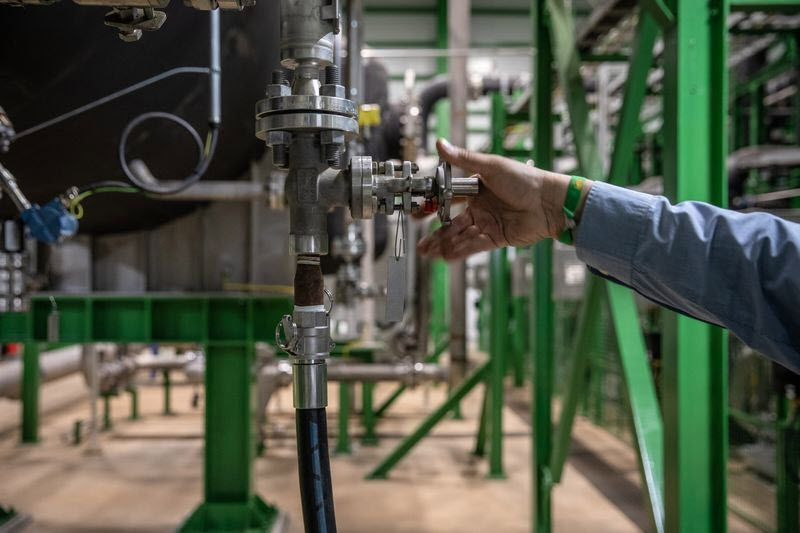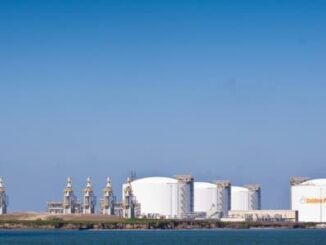A world desperate for a climate-friendly fuel is pinning its hopes on hydrogen, seeing it as a way to power factories, buildings, ships and planes without pumping carbon dioxide into the sky.
But now scientists are warning that hydrogen leaked into the atmosphere can contribute to climate change much like carbon. Depending on how it’s made, distributed and used, it could even make warming worse over the next few decades, even if carbon poses the bigger long-term threat. Any future hydrogen-based economy, they say, must be designed from the start to keep leaks of the gas to a minimum, or it risks adding to the very problem it’s supposed to solve. Some ideas now being tested, like shipping hydrogen in pipelines built to hold natural gas or burning it in individual homes, could cause an unacceptable level of leaks.
“The potency is a lot stronger than people realize,” said Ilissa Ocko, a climate scientist with the Environmental Defense Fund, a non-profit group. “We’re putting this on everyone’s radar now not to say ‘no’ to hydrogen but to think about how we deploy it.”
Hydrogen doesn’t trap heat directly, the way CO₂ does. Instead, when leaked it sets off a series of chemical reactions that warm the air, acting as an indirect greenhouse gas. And though it cycles out of the atmosphere far faster than carbon dioxide, which lingers for centuries, it can do more damage than CO₂ in the short term. Over 20 years, it has 33 times the global warming potential of an equal amount of carbon dioxide, according to a recent UK government report. Over hundreds of years, carbon is more dangerous, due to its longevity.
Hydrogen’s warming potential was never a problem before, as its use was largely limited to oil refineries and chemical or fertilizer plants. But now governments worldwide are investing billions to build a hydrogen economy, seeing the gas as one of the only options for decarbonizing many industries that can’t easily run on electricity. President Joe Biden has set aside $8 billion to build at least four “hydrogen hubs” where the fuel will be produced and used, and states are gearing up to compete. US utility companies that now deliver natural gas see it as a savior, announcing more than two dozen hydrogen pilot projects in the last two years.
“Now is when decisions are being made, and money’s being spent,” Ocko said. “We can get ahead of this issue now, so it doesn’t become a problem.”
She and others sounding this alarm insist it’s no reason to give up on hydrogen. Rather, hydrogen’s heat-trapping power means any future system for producing, distributing and using the gas must be built to minimize leaks.
“There is great potential using hydrogen to save a lot of emissions of carbon dioxide, but it’s really important to keep the hydrogen leakage rates down,” said Nicola Warwick, lead author of the UK study and a National Centre for Atmospheric Science research scientist at the University of Cambridge.

The hydrogen industry acknowledges the problem, even if companies disagree on the potential scope. Dave Edwards, with industrial gas company Air Liquide, said the effects of hydrogen leaks on the atmosphere should be far less than the traditional fuels they displace. Running cars and trucks on hydrogen fuel cells would have less atmospheric impact than running them on gasoline and diesel, even if the system for making and delivering that hydrogen leaks.
“It doesn’t mean it’s not still important, it doesn’t mean we don’t need to understand more about it, but our first impression is it’s much, much smaller,” said Edwards, a director with the company and its chief hydrogen advocate in the US. Hydrogen leaks, he said, “are manageable problems to address.”
Hydrogen has big advantages as a clean fuel. Burn hydrogen in a turbine, and it will generate power without carbon dioxide. Run it through a fuel cell, and it will produce electricity with water vapor as the only exhaust. Unlike solar and wind power, it can be stored in large amounts for when it’s needed. While the vast majority of the hydrogen produced today is stripped from natural gas, in a process that releases carbon dioxide, it can also be separated from water using renewable power, with no emissions but oxygen.
But for all its benefits, hydrogen can also slip easily through equipment designed to contain larger molecules like the methane in natural gas.
Once it escapes, much of the leaked hydrogen will be absorbed by microbes in the soil. Some of what’s left in the air will react with a substance that helps remove methane from the atmosphere. That’s a problem, because methane is itself a powerful greenhouse gas, with more than 80 times the global warming potential of carbon dioxide over 20 years. The reaction between hydrogen and that substance — known as the hydroxyl radical, or OH — leaves less of the OH available to react with methane. So methane entering the atmosphere will stick around longer and do more damage than it would have if the hydrogen hadn’t been there.



